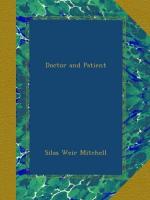As to the miserable sufferers who pass through long illness to death I have little to say. We naturally yield to their whims, pet and indulge them, moved by pitiful desire to give them all they want of the little which life affords them. In acute illness, with long convalescence, I am pretty sure that the tender mother does no real good by over-indulgence; but the subject is difficult, and hard to handle with justice and charity without calling down upon me the indignation of the unthoughtful. It is so easy and pleasant to yield to the caprices of those we love, when they are in pain or helpless from illness,—so doubly hard at such times to say no. Yet, if in the case of a long convalescence, such as follows, perhaps, a typhoid or scarlet fever, we balance for the little one the too-easily yielded joy of to-day against the inevitable stringency of discipline, which, with recovered health, must teach the then doubly difficult lesson of self-restraint, we shall see, I think, that, on the whole, we do not add to the sum of happiness to which the child is entitled.
The mother at the sick-bed of her young child is, however, a being quite often as difficult to manage as her child. All her instinctive maternity is up in arms. Deep in the heart of many mothers there is an unconfessed and half-smothered sense of wrath at the attack which sickness has made on her dear one. Then nothing is too much to give; no sacrifice of herself or others too great to grant or demand. The irritability and feebleness of convalescence makes claims upon her love of self-sacrifice, and her prodigality of tenderness as positive and yet more baneful. That in most cases she may and does go too far, and loses for her child what it is hard to recover in health, is a thing likely enough, yet to talk to her at such times of the wrong she does the child is almost to insult her. Nevertheless the unwisdom of a course of reckless yielding to all a child’s whims is plain enough, for if the little one be long ill or weak, it learns with sad swiftness to exact more and more, and to yield less and less, so that it becomes increasingly hard to do for it the many little unpleasant things which sickness demands. Character comes strongly out in the maladies of the child, as it does even less distinctly in the sickness of the adult. The spoiled, over-indulged child is a doubly unmanageable invalid, and when in illness the foolish petting of the mother continues, the doctor, at least, is to be pitied.




